Feeling anxious and scared is normal if you have kidney failure and your doctor has asked you to start regular hemodialysis. Although hemodialysis is a life-saving treatment, it has its pros and cons. This blog post explores the benefits of regular hemodialysis for patients with end-stage kidney disease.
Hemodialysis is a procedure doctors use to cleanse the blood. The kidney takes away waste from the body through urine. When the kidney fails, toxins gradually build up and makes you feel unwell. Some of the findings in kidney failure are
- fatigue,
- drowsiness
- vomiting, seizures
- abdominal pain
- sleep disturbances
- coma
- and eventually death.
Prolonged life
With kidney failure, if toxins progressively accumulate in the body, it affects the body’s normal functioning and will eventually lead to death. Unfortunately, nobody can tell how long it takes for kidney failure to cause death. With hemodialysis, it is possible to prolong life as it removes these wastes from the body. Some people also use hemodialysis as a temporary measure to get rid of toxins until they can get a kidney transplant.
Reduced fatigue
Many people with CKD complain of fatigue long before being diagnosed with kidney disease. This is particularly common in low-income countries where people do not get regular medical check-ups. Over time, the low energy levels worsen. You may find it difficult to go about your daily activities. Although toxin buildup is not the only cause of fatigue in CKD, hemodialysis can help improve fatigue.
Reduced symptom burden
CKD is associated with a ton of symptoms. Besides fatigue, vomiting and sleep disturbances are pretty common. Many of my patients complain about vomiting, which is usually worse in the morning, especially when brushing their teeth. For others, vomiting occurs at every meal. When vomiting coexists with a loss of appetite, it can impact your nutritional status.
You may also have difficulty sleeping at night but feel very sleepy during the daytime.
Vomiting, sleep disturbances, and other symptoms of CKD may improve with hemodialysis
Improved blood pressure control
Hypertension frequently occurs among people with CKD. With worsening kidney function, you may discover your blood pressure is increasingly challenging to control. As such, your doctor may prescribe many anti-hypertensive medications to get your bp under control. In clinical practice, I often find that when some of my patients begin hemodialysis, their bp control improves. As a result, I may even get to pull out some of their anti-hypertensive medication.
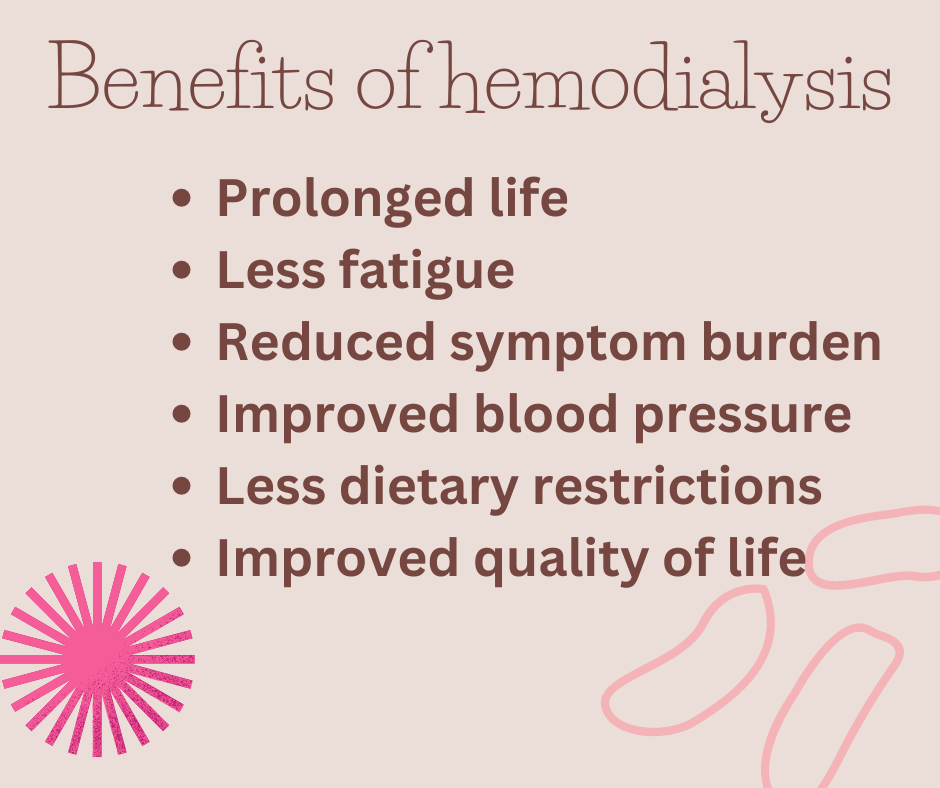
Less dietary restrictions
The kidney regulates many electrolytes, including sodium, calcium, and potassium. With kidney failure, some electrolyte levels may get distorted. Therefore, your doctor will most likely work with your dietitian to get you on an appropriate diet. This may involve restricting some meals.
Potassium, phosphate, and calcium are particularly prone to disturbances. For example, your doctor may request a low-potassium diet if your potassium levels are high. But if you have regular hemodialysis, it is possible to ease off some dietary restrictions. This is because chronic hemodialysis would prevent your potassium levels from getting too high. Many people find the dietary restrictions in CKD tiresome. Dialysis can get you on a more manageable diet plan.
This does not mean that there are no restrictions for people on regular hemodialysis. If you do not make enough urine, your doctor will most likely place you on some water restrictions. This is because they don’t want you to avoid accumulating a lot of fluids and gaining too much weight before your next dialysis.
During dialysis, your team will try to take excess fluids out of your body. Too much fluid in your body will cause body swelling and make it difficult for you to breathe. The problem with trying to take out a lot of fluid at a time is that it makes you prone to having low blood pressure during dialysis, which can be dangerous.
The point here is that some restrictions will still be necessary even if you have regular hemodialysis.
Improved quality of life.
Hemodialysis takes up a considerable amount of your time. The most common regimen is thrice-weekly with each session lasting four hours. However, you may do well with dialysis twice weekly if you still have residual kidney function. For some people, the time required for dialysis is particularly burdensome. But people unbothered by the time requirement may report an improved quality of life, usually from reduced symptoms.
When you feel better, your loved ones also feel better. And so, hemodialysis may improve not just your life but also that of your loved ones.
It is important to note that hemodialysis will not remove all kidney failure symptoms. You see, the kidneys have other functions besides eliminating toxins from the body. For example, the kidneys help in regulating fluid and electrolyte levels. The kidneys also produce several hormones like renin, erythropoietin and active Vitamin D. Erythropoietin is a hormone responsible for red blood cell production, so it is not surprising that people with CKD typically have anemia.
Because hemodialysis cannot replace all the functions of the kidneys, it is crucial to work with your healthcare team to ensure you get the other treatments you need if you decide to start regular hemodialysis.
Alternatives to hemodialysis
You should also know that hemodialysis is one of many options out there for you. For example, you may opt for peritoneal dialysis, although this is less popular or available than hemodialysis.
Kidney transplant is another option, and many doctors prefer this option for younger patients. This is because dialyzing for a long duration is tiring. Besides, they would also be prone to some of the complications associated with hemodialysis. One challenge with renal transplant is that it is expensive, and kidneys for transplant are not readily available. Many people wait years to be able to get one.
Another option is to avoid replacing the function of the kidney but rather treat symptoms as needed. Older individuals, especially if they]have a terminal disease, may opt for this treatment. The choice of which treatment to use ultimately lies with you.
Bottom line
Hemodialysis is a life-saving treatment for kidney failure. However, it has some pros and cons, and it is vital to consider them carefully before making a choice. Kidney failure treatment is individualized. The benefits of hemodialysis are improved symptoms and a better quality of life. However, it requires a significant time commitment and may not be the best option in all situations.

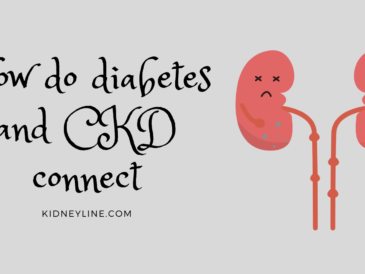
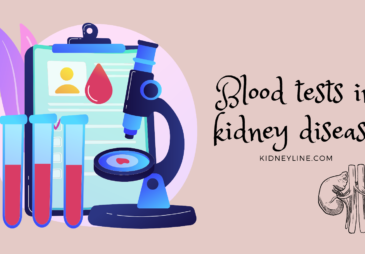
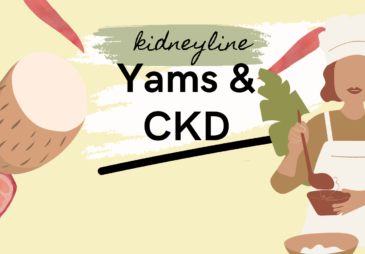
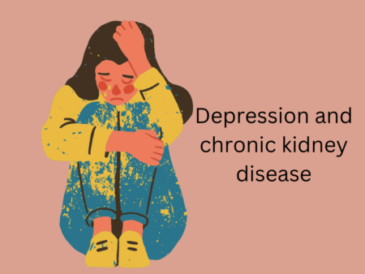
1 Comment
[…] Functional kidneys remove wastes in the body and tightly regulate the levels of several electrolytes. In CKD, the kidneys have difficulty filtering and removing waste products from the blood. This can lead to dangerously high levels of toxins and certain electrolytes. Moreover, studies have demonstrated that a CKD diet can slow the progression of the disease and delay the time to dialysis. […]